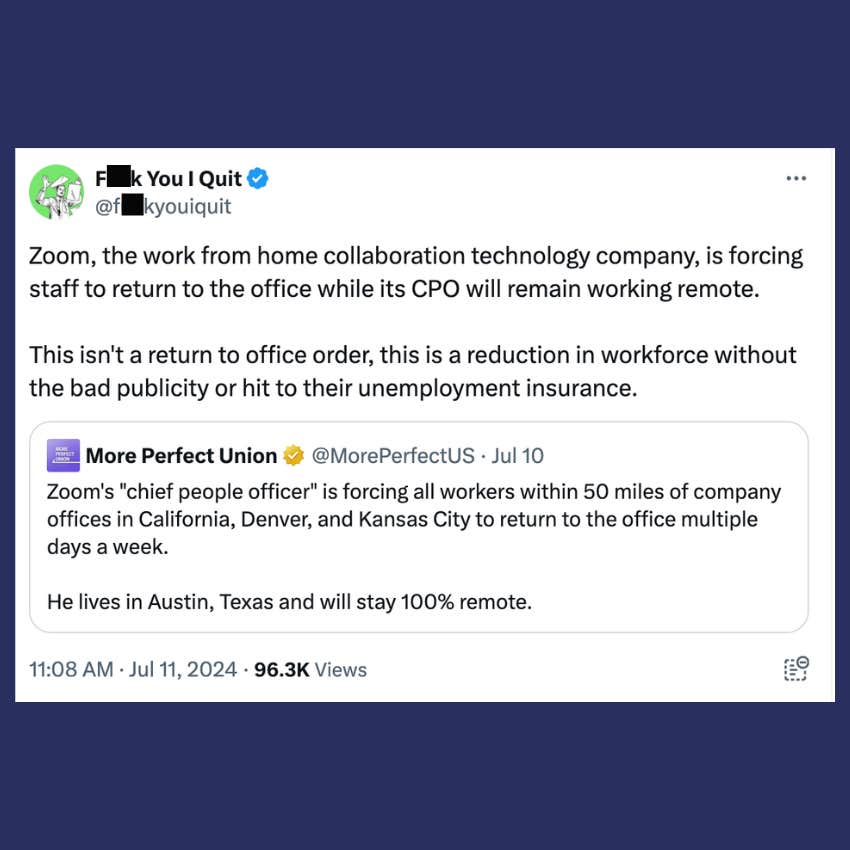Zoom Issues A Return To Office Mandate For Its Workers — But Its 'Chief People Officer' Remains Remote
The company that revolutionized work-from-home doing an RTO is absurd enough. But letting HR stay remote?
 Zinkevych / Getty Images / Canva Pro
Zinkevych / Getty Images / Canva Pro Pretty much every return-to-office mandate so far has been a bust just from an employee morale perspective. But tech company Zoom's RTO arguably makes the least sense of all of them — especially since it leans into the kind of favoritism that often inspires employees to throw their hands up and quit.
Zoom's return-to-office mandate allows its leading HR staff to continue working remotely.
How's this for a giant stick in the eye — you get notified that you need to start coming back to the office full-time or find another job, but the person in charge of handling staffing issues like return-to-office mandates isn't beholden to the new rule and gets to continue clocking in from his home office.
It takes quite a bit of temerity to try to pull that kind of move off, but that's precisely what tech company Zoom has done. Yes, that Zoom.
The company revolutionized working from home and is a household name precisely because it was able to facilitate the en masse move to remote work the pandemic necessitated.
They certainly weren't the first game in town, but Zoom had features that its competitors didn't — namely that it had better capacity to handle the sudden influx of users, it was far easier to navigate for newbies, and it was available to the rank-and-file without an employer's subscription.
All this made it perfect for online schooling and lockdown Zoom cocktail parties alike. None of that happened on Teams or Webex for a reason!
Given all that history, the very notion of a return-to-office mandate at Zoom is downright absurd. You're literally the work-from-home app! And a lot of your employees probably took jobs with you for precisely that reason! But the way the company has chosen to implement its RTO has some crying foul.
The RTO applies to Zoom employees within a 50-mile radius of an office so they can focus on in-person collaboration.
Zoom's reason for returning to the office is rather simple — it has more products than just the video conferencing app we all know and love. "I think a lot of people forget our many products and solutions that are only designed for in-office work," Chief People Officer Matthew Saxon recently told Fortune.
Their customer base reflects this, too. Many of their customers use Zoom products that are specifically and solely designed for in-office work. Saxon said the company can't adequately serve these customers with a 100% remote workforce. (He does not appear to have given Fortune any explanation as to why that is the case.)
So, the company implemented a new return-to-office scheme last August, in which workers within 50 miles of one of Zoom's four offices, located in San Jose and Santa Barbara, California, Denver, Colorado, and Kansas City, Missouri, must come into the office twice a week.
A 50-mile radius constitutes a pretty substantial commute, even if only two days a week, and the high costs of commuting, which have skyrocketed since the pre-pandemic days, are among the main reasons workers have been balking at return-to-office mandates in the first place.
But when it comes to Zoom's RTO, that is far from the main thing raising eyebrows.
The Chief People Officer insists he can do his job — managing people — from his home office in Austin, Texas, without issue.
While Saxon insisted that Zoom's many in-office customers can only adequately be served face-to-face by in-office workers, his own face-to-face, people-centric job — it's literally called Chief People Officer, after all — apparently does not necessitate the same on-site arrangement.
"I think I can manage people at Zoom effectively while working fully remotely,” Saxon told Fortune, once again offering no details for why that is the case. “I go into the office from time to time, obviously, for my role," he went on to say, "but the majority of the time, I’m home." Oh, okay, if you say so!
This uneven application of the policy is an awfully curious choice. Aside from the hierarchical "deal with it, peons" message it sends to workers, it doesn't really make much sense.
Zoom employees servicing in-office clients presumably have to fly to those clients' offices to do their in-person work, so what difference does it make where they do their jobs the rest of the time?
 @[eff]youiquit / X
@[eff]youiquit / X
The inequitable enforcement certainly raised hackles online. To the irreverently named X (aka Twitter) account "[Eff] You I Quit," which focuses on workplace and labor issues, it stunk of an outright ploy for "a reduction in workforce without the bad publicity or hit to their unemployment insurance."
They are certainly not the first to theorize that layoffs without the drama are what's really behind many return-to-office mandates.
One thing is for sure — what's not behind RTO mandates, no matter what business leaders claim, is higher productivity or profits. A major study by the University of Pittsburgh of hundreds of Fortune 500 companies found that 99% of them saw no increase in profit from RTO mandates — but they did see a staggering drop in employee morale, which leads to very expensive turnover.
If pissing your employees off is the goal, an RTO is the way to go, and you probably couldn't come up with a better version than one that forces employees to drive 50 miles to do their jobs without justification while the Chief People Officer gets to keep chilling in his home office.
John Sundholm is a news and entertainment writer who covers pop culture, social justice, and human interest topics.

